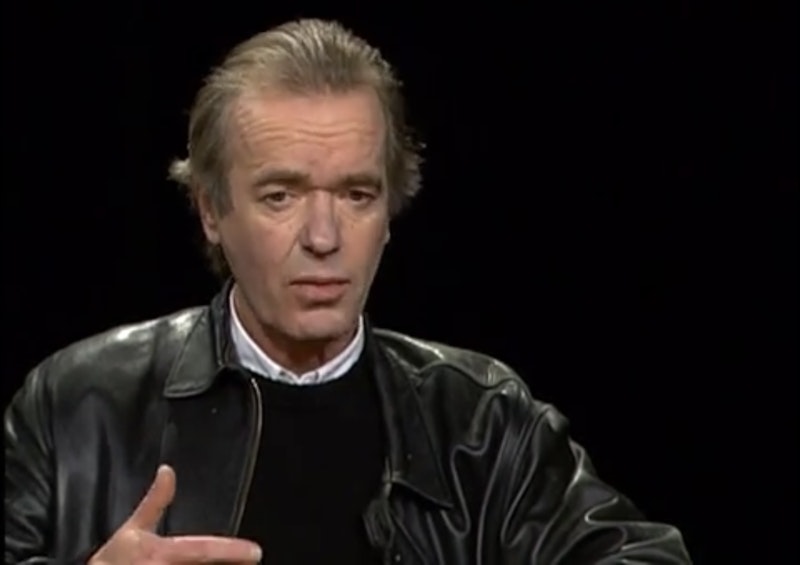A clip of Martin Amis is going around where the late novelist talks about clichés and how awful they are. The interviewer’s Charlie Rose. Amis doesn’t look at him too much; most of the time he’s got his face aimed away and from there he discusses his topic. Having his face toward Rose would only invite that hyperactive man-dog to lurch into the proceedings. Or else Amis just didn’t want to look at him. At any rate he had his thoughts lined up and spoke them well. The dead writer nailed it and I don’t consider nailed it a cliché. It was a cliché but then it died and went to heaven and now it’s a figure of speech. A theory outlining this life cycle will be my addition to Amis’ remarks.
Sometime in 1987 or so, a guy said, “Listen, Sales went in there and, yeah, we nailed it.” That guy knew he’d turned a phrase; it made his meaning light up like a bulb. By now the phrase lights up nothing, but it does convey. The meaning comes across swift and sure, and then we’re on to the nextpoint. Dead cliches, as I think somebody called them, are turds that have petrified and now can be put to decent use. Somebody clever got off a good one and everybody kept repeating it, and then, a long time after tedium set in, the phrase became useful. Reason: as a bright little inspiration it was done to death and all you noticed was the meaning.
Of course, I made up the turd metaphor, and you’ll note that it’s not quite on target. A turd shouldn’t come out of a person’s mouth. Plus, the turd in question starts out as something valuable. What we need is a pearl that comes out of a person’s mouth, a pearl that becomes a turd, a cow turd, and after that the turd petrifies, etc. Luckily we’ve got pearl there handy. We’ve got a word that turns a person’s utterance into a small object, all because of “pearls of wisdom” and everybody who kept repeating that phrase so long ago. Maybe we’ll get one for the pearl-to-turd transition.
We need it because the transition keeps happening. Mass repetition of a nifty phrase works two kinds of magic. Before beating the phrase flat and dry, the same process infuses it with wet crappiness, the élan vital of cliché. Two different results from the same activity, and the reason lies in attitude. Late in the cycle the speaker’s attitude is one of familiar indifference toward anything but a handy meaning. Early on matters are different: self-appreciation’s involved. The new term becomes a rank splat on the sensibility because there’s a smidgen of shitty self-regard with each repetition, and the smidgens accumulate into filth, and a dollop of that filth arrives in your reading matter.
Hence the cringing and noisy complaints of sensitive souls. For us it’s not just the monotony of the cliché experience, or the way cliches cheat the ability to see (Amis’ big point). Along with that, you feel crowded and abused by the self-flattery of dullards. The ceiling for what’s good has just come down, and it’s because countless people have scored themselves a “dig me” moment by saying the thing that everyone right now agrees is clever (and/or vivid, incisive, striking). Because of them, repeating nails it (or whatever) now counts as good, and it’s all just a reminder that what’s the point.
This keen shitty smell is gone by the time a cliché dies. Resentful boredom’s been addressed too, since a dead cliché doesn’t purport to dazzle and therefore doesn’t let you down. Altogether dead cliches are less noticeable than live ones. Several together will produce a sound, a comfortable sound that dulls the brain. At that point overload’s being approached, not just prosody-wise but semantically: pretty soon writer and reader will believe that meaning’s being communicated when it’s only being gestured at. By itself, though, nails it is okay. Get a clutter of phrases like that and your prose is in hock. But otherwise no.
Once nails it, all by itself, might’ve been too much, a signal of assumptions that ruled out large areas of intelligent thought. The upsurging culture of enterprise and mission accomplishment, the coffee achievers. When I first saw nails it, maybe all that was going on. If so, imagine the stink on the phrase. Not just borrowed cleverness, but borrowed identity: say this dumb thing so you can feel like you’re part of the incisive, go-for-it, etc. Cliches often carry such a payoff, and identities depend on beliefs; accordingly, a ripe cliché is more likely to have large, even distended, ideas and attitudes attached.
But dead cliches have shriveled. There’s nothing to block the view until you get a pile. Read a bestseller and you’ll seethat pile. Look upon Charlie Rose and you see the cliché cycle's other end. Not the person who said the clever thing, but the one just after: the big wet mouth that’s going to repeat. Martin Amis looks away, and there let us leave them.

